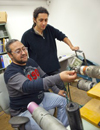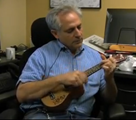


Qualified staff are encouraged to apply for the jobs below, or forward to others who might be interested. Go here to see a full listing of open positions.
Software Developer 3 (Physical Biosciences/JBEI) Create and maintain Registry of Biological Parts; develop synthetic biology software and computer-aided biological design and tools.
eProcedures Specialist (Facilities) Provide development, revision and ongoing review of Facilities work procedures. Maintain website and coordinate the development of training resources and tools.
Research Associate (Chemical Sciences) Participate in NIH funded projects to develop new therapeutics for actinide and toxic metals decorporation and/or decontamination.
Controls Coordinator (Engineering) Provide coordination and technical support for implementation of experimental apparatus, equipment, systems, or facilities.
 Outreach: Arkansan Faculty, Students Hunt Neutrino-less Double Decay
Outreach: Arkansan Faculty, Students Hunt Neutrino-less Double Decay Under the mentorship of Berkeley Lab nuclear scientist Azriel Goldschmidt (right), Abdel Bachri and his physics students at Southern Arkansas University are helping in the hunt for the neutrino-less double decay, one of the rarest decays in nature. Many top scientific teams around the world are on the hunt to confirm this phenomenon, which would demonstrate that physicists’ standard model of particles is incomplete and will very likely bring a Nobel Prize to the winning team. They are participants in the Faculty and Student Teams (FaST) program, one of more than a dozen educational and internship programs offered by Berkeley Lab’s Center for Science and Engineering Education. More>
 Wandering the halls in Building 310, the busy afternoon lunch buzzes are often interrupted by intriguing music coming from Joint Genome Safety Coordinator Stephen Franaszek’s office. Once or twice a week, the Ukulele Club gathers together there to practice and play a variety of music selections. For over a year and a half now, Franaszek has been bringing in ukuleles to his office for the club and anyone else who has the desire to learn and play a tune. He keeps three or four in his office, but has another seven working ones at home, not to mention two that he is fixing up. Go here for more, including a video of Franaszek.
Wandering the halls in Building 310, the busy afternoon lunch buzzes are often interrupted by intriguing music coming from Joint Genome Safety Coordinator Stephen Franaszek’s office. Once or twice a week, the Ukulele Club gathers together there to practice and play a variety of music selections. For over a year and a half now, Franaszek has been bringing in ukuleles to his office for the club and anyone else who has the desire to learn and play a tune. He keeps three or four in his office, but has another seven working ones at home, not to mention two that he is fixing up. Go here for more, including a video of Franaszek.
 How do we make the Volt cheaper? Two quick notes on things that recently happened. The first represents the present; the second (hopefully) the future. Chevy Volt pricing is $41,000. No surprise there. There is a tax rebate that gets this down to $33,500. The leasing option seems cheaper, but is limited to 12,000 miles a year. I drive 18,000 a year and I rent (which means no charging at home for me). I will not be in line for one anytime soon. The Nissan Leaf is $33,000 before rebates and $25,500 after. This seems so much more manageable, but it only has a 100-mile range. You win some, you lose some. What we need is a cheaper battery. More>
How do we make the Volt cheaper? Two quick notes on things that recently happened. The first represents the present; the second (hopefully) the future. Chevy Volt pricing is $41,000. No surprise there. There is a tax rebate that gets this down to $33,500. The leasing option seems cheaper, but is limited to 12,000 miles a year. I drive 18,000 a year and I rent (which means no charging at home for me). I will not be in line for one anytime soon. The Nissan Leaf is $33,000 before rebates and $25,500 after. This seems so much more manageable, but it only has a 100-mile range. You win some, you lose some. What we need is a cheaper battery. More>
 Thursday and Friday the Accelerator and Fusion Research Division holds a “Mini-Workshop” on Compact X-Ray FELs (Free Electron Lasers) Using High-Brightness Beams. Jonathan Wurtele, Marco Venturini, and Gregg Penn worked with Center for Beam Physics program head John Corlett to bring top FEL experts from UCLA, Livermore, the University of Wisconsin, SLAC, Argonne, the United Kingdom, and Korea together with Lab staff, postdocs, and students. The workshop wraps up a summer research program aimed at reducing the footprint while improving the performance of future light sources, including components like electron guns and linacs as well as novel undulator designs.
Thursday and Friday the Accelerator and Fusion Research Division holds a “Mini-Workshop” on Compact X-Ray FELs (Free Electron Lasers) Using High-Brightness Beams. Jonathan Wurtele, Marco Venturini, and Gregg Penn worked with Center for Beam Physics program head John Corlett to bring top FEL experts from UCLA, Livermore, the University of Wisconsin, SLAC, Argonne, the United Kingdom, and Korea together with Lab staff, postdocs, and students. The workshop wraps up a summer research program aimed at reducing the footprint while improving the performance of future light sources, including components like electron guns and linacs as well as novel undulator designs.
The Lab’s Health Care Facilitator wants to remind employees that August is Psoriasis Awareness Month. Psoriasis is a non-contagious, lifelong skin disease that according to the National Institutes of Health affects 7.5 million Americans. The cause of psoriasis is not known, but it is believed to have a genetic component. Most researchers agree that the immune system is somehow mistakenly triggered, which speeds up the growth cycle of skin cells. More>
Today
at Berkeley Lab encourages feedback and story ideas
Deadline for submissions is 10 a.m. two days prior to publication
TABL is produced by Public Affairs' Communications Group